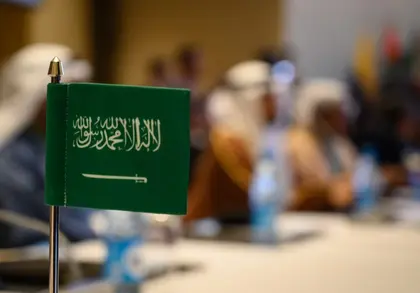Saudi Arabia’s Ukraine peace summit has concluded with little in the way of solid agreements but enough to provoke an overly-dramatic response from the Kremlin.
JOIN US ON TELEGRAM
Follow our coverage of the war on the @Kyivpost_official.
The host country’s aims for the event were grand – “reaching a solution that will result in permanent peace.”
But analysts previously suggested it would achieve little and Saudi Arabia was more interested in flexing its international muscles.
- Get the most recent war in ukraine update from the Kyiv Post's daily news reports for today.
- See the most recently published Ukraine news reports from today.
Yet the holding of the event was a success of sorts in itself for Ukraine – organisers succeeded in bringing together representatives of the four members of the influential BRICS bloc besides Russia: Brazil, India, China and South Africa, all of whom have maintained relations with the Kremlin to varying degrees since the start of Moscow’s full-scale invasion.
The event appears to have ruffled some feathers at the Kremlin which had to sit and watch as countries it counts as its allies, met with a Ukrainian delegation and held talks.
Russian Deputy Foreign Minister Sergei Ryabkov was quoted by the state news agency TASS as saying the summit was “a reflection of the West's attempt to continue futile, doomed efforts to mobilise the international community and more precisely, the Global South, even if not entirely, in support of the so-called Zelensky formula, which is doomed and untenable from the outset".
As expected, no final declaration was due to be released, though a European source told AFP there had been agreement on key points, including that respect for Ukraine's “territorial integrity and sovereignty” should be “at the heart of any peace settlement.”
German Foreign Minister Annalena Baerbock told Bild that “every millimeter of progress toward a fair and honest peace brings a glimmer of hope for the people of Ukraine.”
There were some other encouraging signs – China, Russia’s most powerful international ally, participated “actively and was positive” about the event and "was positive about the idea of a third meeting at this level," the European source said.
But Brazil chose to raise what it saw as an elephant in the room – foreign policy adviser Celso Amorim, used his prepared remarks to stress that "any real negotiation must include all parties," including Russia.
“Although Ukraine is the biggest victim, if we really want peace, we have to involve Moscow in this process in some form.”
The Ukrainian delegation was pushing Zelesnky's 10-point peace formula, which calls for the full withdrawal of Russian troops from Ukrainian territory. It also calls for the restoration of Ukraine's borders – including the territory of Crimea, unilaterally annexed by Russia in 2014.
Kyiv has ruled out negotiations until Russia withdraws from its territory. Russia has in the past said any negotiations would need to take into account "new territorial realities".
A French diplomatic source said “efforts were converging to create the conditions for a valid negotiation.”
The source added: “Does today's meeting create these conditions? Clearly not. It's a long-term effort.”
As for Ukraine, Kyiv released a statement on Sunday afternoon summarising the event and what it achieved which focused more on the processes rather than any actual results.
Andriy Yermak, Head of the Presidential Office, said: “We had very productive consultations on the key principles on which a just and lasting peace should be built. We had an extremely honest, open conversation, during which representatives of each country could voice their position and vision.
“There were different views, but all the participants demonstrated their countries' commitment to the principles of the UN Charter, international law, and respect for the sovereignty and inviolability of the territorial integrity of states.
“And it is on these principles that President Zelenskyy's Peace Formula is built, which we have described in detail.”
The statement added: “The parties agreed to continue working at various representative levels to establish a just and comprehensive peace.”
With peace still a long way off, expectations for the event had never been high – some analysts suggested Saudi Arabia was more interested in flexing its international muscles on the world stage rather than concrete results.
"In hosting the summit, Saudi Arabia wants to reinforce its bid to become a global middle power with the ability to mediate conflicts while asking us to forget some of its failed strategies and actions of the past, like its Yemen intervention or the murder of Jamal Khashoggi," Joost Hiltermann, Middle East programme director for the International Crisis Group, said before the event.
The Jeddah meeting followed talks in Copenhagen in June that were designed to be informal and also did not yield a final declaration.
In his evening address on Saturday, Ukrainian President Volodymyr Zelensky said that 42 countries were represented in Jeddah and that the Ukrainian delegation was pushing his 10-point peace formula, which calls for the full withdrawal of Russian troops from Ukrainian territory.
It also calls for the restoration of Ukraine's borders -- including the territory of Crimea, unilaterally annexed by Russia in 2014.
Russia has in the past said any negotiations would need to take into account "new territorial realities".
You can also highlight the text and press Ctrl + Enter



